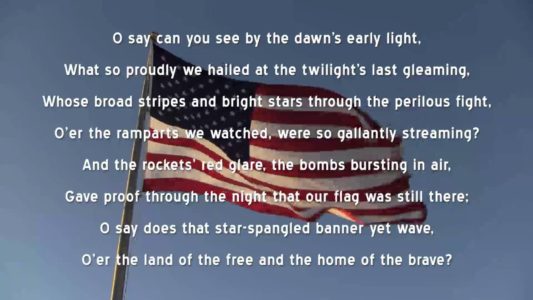
It is only a matter of time before the politically correct thought police target the National Anthem.
With statues falling across the nation and flags being furled and put to rest, why hasn’t our most sacred song gone the way of, let’s say, Dixie?
By now, most of America knows that Colin Kaepernick, late of the San Francisco 49ers football team, refused to stand for the National Anthem because he thought it was hypocritical to respect a song that celebrates America as the “land of the free” when he (and other sports players and others) believe that the conditions of minorities in America belie these words.
But how many people know that the man responsible for the Anthem was himself a racist?
After all, Frances Scott Key, the composer of our anthem, was a notorious racist and slaveholder and was so criticized, even in his own time, by abolitionists.
Christopher Wilson of the Smithsonian wrote just last year about Key’s problematic history. When Key wrote the poem in 1814 that would in 1931 become our national anthem, he was a slaveholding lawyer from an old Maryland plantation family who harbored very pronounced views on black people.
Key not only profited from slaves, he harbored racist conceptions of American citizenship and human potential. Africans in America, he said, were: “a distinct and inferior race of people, which all experience proves to be the greatest evil that afflicts a community.”
As Wilson notes, when Key wrote his famous poem about the land of the free, it is likely that black slaves were trying to reach British ships in Baltimore harbor, and “they knew that they were far more likely to find freedom and liberty under the Union Jack than they were under the ‘Star Spangled Banner.'”

The Star-Spangled Banner in 1873, photographed in the Boston Navy Yard (Wikimedia Commons, George Henry Preble) via Smothsonian.
Key was the district attorney for the City of Washington from 1833 to 1840 and used his power to defend slavery and attacked the abolitionist movement in several high-profile cases.
In 1836, there was a vicious race riot in Washington when a white mob attacked a well known and free black restaurant owner. Key used his power to crack down on abolitionists, who he thought were riling matters.
Wilson writes:
In the same year, shortly after a race riot in Washington, D.C. when an angry white mob set upon a well-known free black restaurant owner, Key likewise sought to crack down on the free speech of abolitionists he believed were riling things up in the city. Key prosecuted a New York doctor living in Georgetown for possessing abolitionist pamphlets.
In the resulting case, U.S. v. Reuben Crandall, Key made national headlines by asking whether the property rights of slaveholders outweighed the free speech rights of those arguing for slavery’s abolition. Key hoped to silence abolitionists, who, he charged, wished to “associate and amalgamate with the negro [sic].”
Though Crandall’s offense was nothing more than possessing abolitionist literature, Key felt that abolitionists’ free speech rights were so dangerous that he sought, unsuccessfully, to have Crandall hanged.
Every time Americans stand and sing the National Anthem, they are honoring the man who composed this most memorized song among Americans, one sung at innumerable events across America.
Will there now be a call for millions of others to join a chorus calling for a boycott of our national anthem? Maybe Lin-Manuel Miranda, of Hamilton fame, can come up with a nifty hip-hop substitute.
